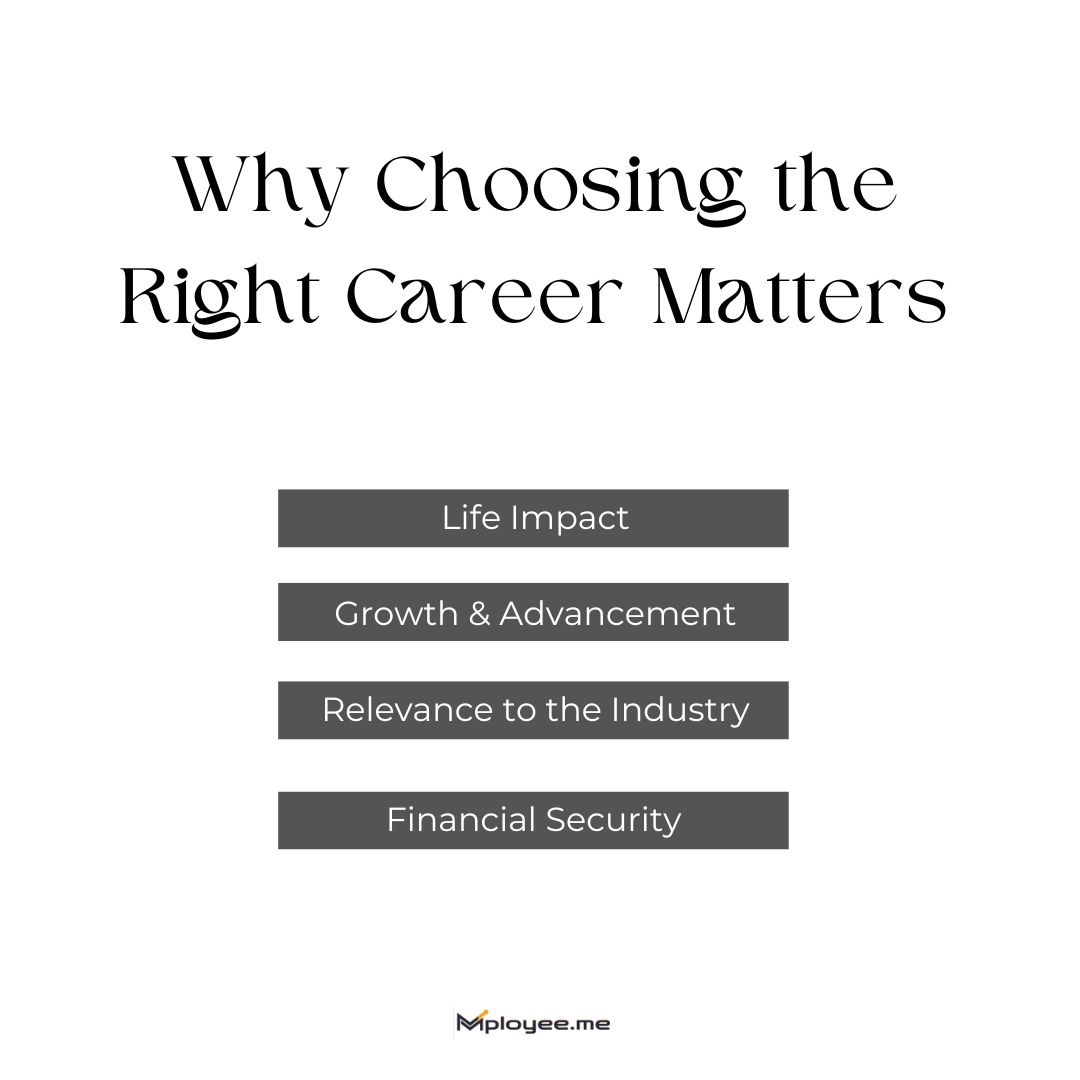
We'll cover
What Career Should You Pick After Graduation?
Written By Editorial Team

Graduation is a passageway; hence the immediate thing that joins in consideration is "what to do next?" Postgraduation, a graduate has many options - a job, further studies, starting a fresh business, etc. It is bewildering for many fresh graduates. One needs to seriously think about one's interests and skills and then research what jobs are in demand. Understanding those skills that are core to one's interests and will sustain growth in the future should be the basis for any decision. Job Match Pro can assist him/her by showing jobs that fit the profile for easier need of direction post-graduation.
We'll cover:
Why Choosing the Right Career Matters
Choosing a career is not just about getting a job; one chooses the direction of the entire professional life. A good job would provide well-being, comfort, and long-term growth.
Here's why this choice and its impact matter:
- Life Impact: Fulfilling jobs lead to a healthy mind and work-life balance.
- Growth and Advancement: Constant Learning, promotion, and salary increments are all guaranteed with the right option.
- Relevance to the Industry: The right career will mold you to suit a rapidly changing economy.
- Financial Security: Right career will ensure that you meet wealth accumulation targets as well as life-goals.
Example: An individual who is a graduate and joins a digital marketing agency, with a flair for creativity and analytics finds an answer, constant learning, and rapid growth in a booming industry.
Hence, to find jobs for fresh graduates, it's more than employment; it's about laying the foundation for a fulfilling existence.

Self-Assessment: Understand Yourself First
Yet before exploring a whole host of career options after graduation, one might for once look inward. Self-assessment may include:
- Identifying Strengths: Are you good with numbers? Creative ideas? Problem solving?
- Understanding Interests: Do you like working with people, designing, or doing research?
- Evaluating Personality: Are you introverted or extroverted? Do you enjoy working by yourself or with others?
- Considering Values: Is high income important to you? Is job security? Work-life balance? Social cause?
Good tools to use in self-assessment include:
- Myers-Briggs Type Indicator (MBTI)
- SWOT Analysis (Strengths, Weaknesses, Opportunities, Threats)
- Career Aptitude Tests
Example: A commerce graduate may conclude that his strength is in analysis, whereas business strategy is what interests him. In this case, such information opens up front-line choices like financial analyst or business consultant or marketing strategist.
When you take plenty of time in assessing yourself first, smoothening begins the filtering of right jobs after graduation, to put aside choices that could bring dissatisfaction.
Explore Career Options Based on Your Degree
Your degree greatly helps in fine-tuning the possible career choices after graduation. We present below a few common academic courses and the correlating occupations:
For Engineering Graduates:
- Mechanical Design Engineer
- Embedded Systems Developer
For Commerce Graduates:
- Chartered Accountant
- Marketing Executive
For Arts Graduates:
- Event Manager
- Psychologist
For Science Graduates:
- Lab Technician
- Research Associate
- Environmental Consultant
- Health Officer
A career-oriented toward one's academic background but with a different perspective can be a solid base for freshers to start with confidence and find jobs for fresh graduates.
Should You Follow Your Passion or Job Market Trends?
This is undoubtedly one of the more common dilemmas that students face in choosing jobs after graduation. Should one take a chance and pursue his or her dreams, or should he or she join trending career options after graduation so that there are at least some offers from any company providing an assured job and pay? Generally speaking, a tactful combination of both would do wonders for these choices.
When to Follow Your Passion:
If your passion is aligned with the career opportunities after graduation that are growing, working on that could mean a fulfilling life along with long-term success.
- You have clear goals: If one already knows what one loves doing and has chosen to develop skills toward it, this path is rewarding.
- If you will work for it along the way: Passions generally require a lot of work working toward mastery, side projects, or even unpaid work at first. If you can go through that, then go for it.
- If the market is looking for it: Always confirm that your passion can pay your bills. Check job portals and freelance platforms, and growing industries for some monetizable passion points.
- You are driven by purpose: Some people prefer meaning over money. If one's passion helps or solves him or her, then they ought to look into it.
Follow Job Market Trends When:
Most graduates from universities like to seek steadiness after some years of study. If you are still not sure what you want to pursue or if your area of interest does not pay immediately, then consider following job market trends.
- You need a quick financial independence: These usually are high in number, jobs for fresh graduates such as in IT, BPOs, or digital marketing, which also pay a fair amount to get started.
- Your passion finds no way into the available profession just after graduation: Not every passion leads to stability in a profession. Use these trends as your guide, all the while still nurturing your own interests.
- If you want to roam between domains: Some after-graduate jobs like product management, data analysis, and consulting, give room to try out roles and industries a few times before planting down.
- If your skill set is in demand: In case you have any expertise in programming, analytics, or communication, consider top-shot jobs in tech, finance, and digital media.
Examples:
- Suppose a graduate is very passionate about art but worried about his/her income; such a person takes up UI/UX in tech and does freelancing during weekends.
- Another example would be of a finance graduate passionate about travel who may look into remote finance jobs or content creation for financial travel hacks.
It surface only those roles with strong resume alignment—perfect jobs for fresh graduates that balance interest and market demand.
Consider Remote Work and Digital Careers
The past pandemic world has seen the blossoming of the remote-work opportunity. Digital careers provide flexibility, global reach, and scalability.
Popular remote careers include:
- Software Development
- Content Creation
- Virtual Assistance
- Data Analytics
Benefits of Digital Careers:
- Work anywhere from anywhere
- International opportunities
- Cost savings on commute
- Work and life balance
Remote Work Platforms:
- Upwork
- Jobmatch Pro
- Fiverr
- Toptal
- RemoteOK
For Example: A literature graduate may work as a freelance writer, editor, or even start a book review YouTube channel-these are all distant-based professions.
Remote roles are definitely worth thinking about for graduation jobs that pride themselves on freedom and innovation.
Should You Go for Higher Studies?
After graduation, it’s good to go for further studies to deepen your knowledge and enhance your set of skills rather than finding career options after graduation. Higher specialized studies open the doors to higher specialized work, and they also have the chance to work or study abroad. So whether you go off for higher studies at once or after working some time, further education usually works to your advantage. A little thinking can thus be done on whether this step is in tune with your present goals and circumstances.
When to Consider Higher Studies:
- Your desired career calls for more degrees: Certain fields, for instance, law, medicine, academic research, data science, or clinical psychology, often require the candidate to have a master's degree or a PhD degree. These are not optional- one has to accomplish them before entering the profession.
- You want to switch sectors: For instance, you are an engineering graduate who wants to go into marketing or finance. Then an MBA will help you do so easily. One might also have to be formally certified to switch from commerce to design or tech.
- You did not have much fun doing your undergraduate focus and would like a pivot: If your undergraduate experience did not relate to your interests, higher studies help you jettison that chapter and start anew. For instance, a psychology student can land in HR or counseling; a literature student can, with some postgrad, switch to media or PR.
Popular Higher Study Routes:
- MBA (Master of Business Administration): Ideal for management, entrepreneurship, marketing, HR, and business strategy. Whereas MBA graduates are offered leadership opportunities and attractive packages.
- M.Tech or MS (Master of Science): Good opportunities for technical specializations such as Artificial Intelligence, Machine Learning, Robotics, or Civil/Mechanical advancements. MS abroad also gives you exposure to research-intensive environments.
- Masters programs in Design, Economics, or Arts: These programs offer depth for students pursuing creative and analytical fields. Master of Design can get you into UI/UX or product design roles while Master in Economics could lead you into policy research or finance.
- Study Abroad Programs: Countries like the USA, UK, Canada, Germany, and Australia have high-ranking institutions and offer post-study work opportunities as well. In contrast, studying abroad also enhances soft skills, language skills, and ability to adapt.
Pros of Going for Higher Studies:
- Better jobs and packages: Higher studies can open up newer avenues for advanced jobs and better pay packages. Postgraduates rent the land higher and grow faster along the career path compared to a bachelor's degree holder.
- Global recognition: A degree attained from a reputed foreign university can give his resume a global edge. It lends credence to one's profile and enhances attraction for potential employers in many blocks.
- Networking opportunities: Since in a university environment, your future candidates-the peers, professors, alumni, and industry mentors-have the same goals, the networking opportunities that are present can prove to be mutually beneficial in the future.
- Skill enhancement: Typically, Masters study teaches updated course content, practical tools, and actual case studies. You will always remain in tune with the latest industry developments and ready to apply what you learned from real-case scenarios.
- Personal Development: The following in itself is education, as opposed to schooling. Higher education- more so abroad- equips you with life skills like independence, time management, critical thinking, and clear communication. It is an experience that fosters growth on your professional and personal fronts.
Cons of Higher Studies:
- Time and costs: Most of the postgrad programs require 1–2 years to be completed, with a considerable amount of investment. If you are unsure about the investment return, it may be better for you to wait.
- Potential job delay: Those who chose to go to work will, in the meantime, gain experience and promotion in their respective fields.
- Admission pressure: Difficult entrance exams, high GPA requirements, and possibly visa complications (if overseas) can put tremendous stress on the prospective candidates.
- Uncertainty in ROI: A degree in itself may or may not fend for a high-paying job, hence, you have to put more into career planning, especially if you are going for fields like humanities or niche arts programs with very few openings.
Before spending time and money on this, look into entry-level jobs that encourage learning on the job. You can always go for a higher degree later after radiation.
Conclusion
Being able to say that a choice in any of the career opportunities after graduation is not a one-size-fits-all. It is a journey of self-discovery, skill enhancement, and market exploration. Whether she wants the old jobs after graduation, she wants remote work after graduating, or she wants to continue her education after graduating, the colored path she picks should really restore her values and long-term aspirations.
Stay curious, be learning, and use sharp tools like Job Match Pro to discover those matching career opportunities after graduation on high. A good first step after graduation really goes a long way toward crafting the future that you want.
What are the highest paying jobs after graduation?
Technology, finance, and healthcare are a few industries that offer the highest salary packages. In these industries, one can consider the jobs of software developers, investment bankers, and data analysts.
Which is the best career option after graduation?
What career should one choose after graduation?
What job can you easily get after graduation?
What job opportunities are there for a fresher?
What can I do after graduation if I don't know what to do?
How to decide on a career path after graduation?

Got Your Answer ?
Learn this in 30 Seconds 👇
Career Blogs
Our career blog is your go-to resource for insightful advice, practical tips, and the latest trends in the job market.

Office Address: Room No 305, IIT ROPAR-TBIF, Top Floor (East Wing), M.Visvesvaraya, Rupnagar PB, 140001
- Free Online Resume Review
- Check Resume Score
- Job Description Keyword Finder
- Resume Shortlisting Software
- Resume Scanner for Jobs
- Find jobs that match with resume
- Job matching platform
- Resume job matching
- Job suggestion
- Best sites to find jobs
- Free ats resume scanner
- Auto apply for job
- Full Time Jobs
- I Need a Job
- Information Technology Jobs
Can't Find Something? Get in Touch.
©2026 Padhakku Peek A Book Pvt Ltd (Mployee.me)






